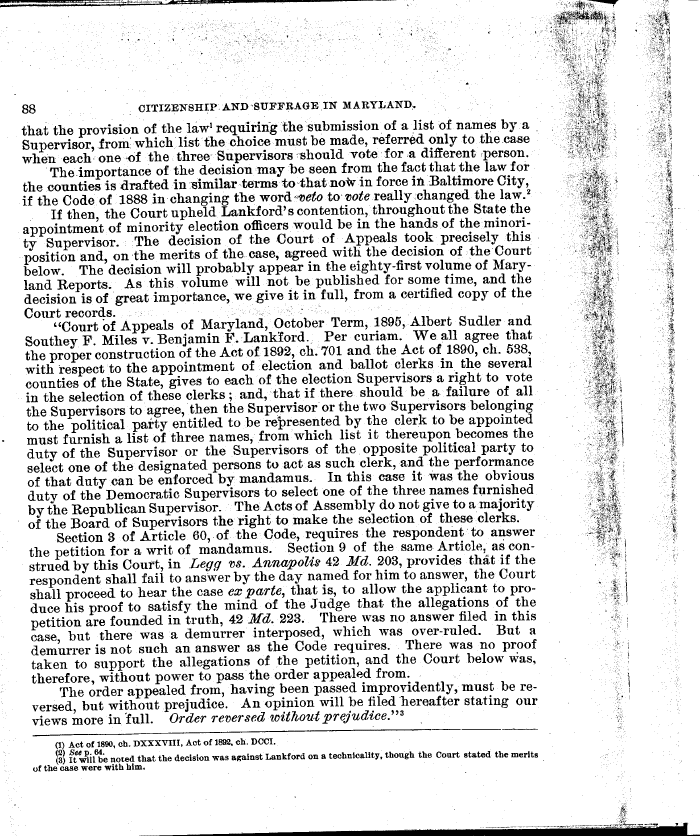|
$$ CITIZENSHIP.AND~$UFFRAGE,IN MARYLAND.
that the provision of the law' requiring the submission, of a list of names
by a
Supervisor, from: which list the choice must be made, referred only to the
case
when each one of the three Supervisors should vote for .a different -person.
The.importance of the decision may be seen from the fact that the law for
the counties is drafted in aimilar-texms to-that noZv in force in Baltimore
City,
if the Code of 1888 in changing the word --veto to-vote really :changed the
law.2
If then, the Court upheld Lankford's contention, throughout the State the
appointment of minority election officers would be in the hands of the
minori-
ty Supervisor. The decision of the Court of Appeals took precisely this
position and, on the merits of the case, agreed with the decision of the
Court
below. The decision will probably appear in the eighty-first volume of Mary-
land Reports. As this volume will not be published for some time, and the
decision is of great importance, we give it in full, from a certified copy
of the
Court records.
"Court of Appeals of Maryland, October Term, 1895, Albert Sudler and
Southey F. Miles v. Benjamin F. Lankford. Per curia.m. We all agree that
the proper construction of the Act of 1892, ch. 701 and the Act of 1890,
ch. 538,
with respect to the appointment of election and ballot clerks in the several
counties of the State, gives to each of the election Supervisors a right to
vote
in the selection of these clerks; and, that if there should be a failure of
all
the Supervisors to agree, then the Supervisor or the two Supervisors
belonging
to the political party entitled to be represented by the clerk to be
appointed
must furnish a list of three names, from which list it thereupon becomes the
duty of the Supervisor or the Supervisors of the opposite political party to
select one of the designated persons to act as such clerk, and the
performance
of that duty can be enforced by mandamus. In this case it was the obvious
duty of the Democratic Supervisors to select one of the three names
furnished
by the Republican Supervisor. The Acts of Assembly do not give to a majority
of the Board of Supervisors the right to make the selection of these clerks.
Section 3 of Article 60, . of the Code, requires the respondent to answer
the petition for a writ of mandamus. Section 9 of the same Article; as con-
strued by this Court, in Legg vs. Annapolis 42 Md. 203, provides that if the
respondent shall fail to answer by the day named for him to answer, the
Court
shall proceed to hear the case ex paste, that is, to allow the applicant to
pro-
duce his proof to satisfy the mind of the Judge that the allegations of the
petition are founded in truth, 42 Md. 223. There was no answer filed in this
case, but there was a demurrer interposed, which was over-ruled. But a
demurrer is not such an answer as the Code requires. There was no proof
taken to support the allegations of the petition, and the Court below was,
therefore, without power to pass the order appealed from. .
The order appealed from, having been passed improvidently, must be re-
versed, but without prejudice. An opinion will be filed-hereafter stating
our
views more in full. Order reversed without prejudice. 113
(1) Act of 1890, ch. D%%%VIII, Act of 1892, ch. DCCI.
(2) See P. 64.
(8) It will be noted that the decision was against Lankford on a
technicality, though the Court stated the merits
of the case were with him.
|

